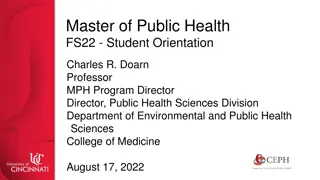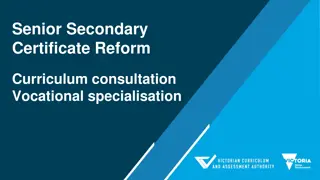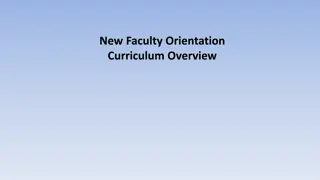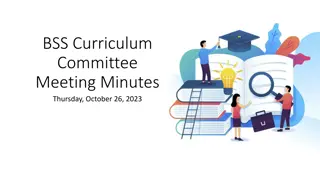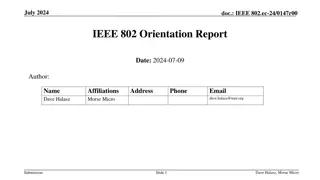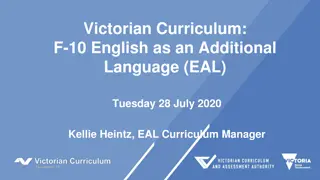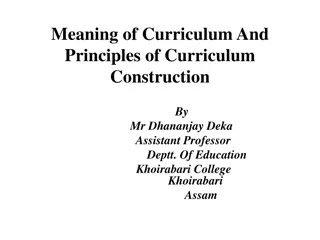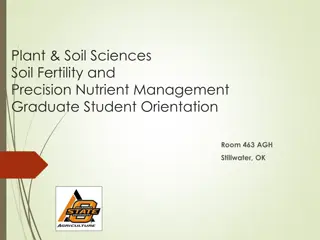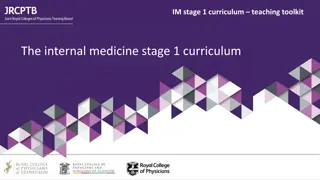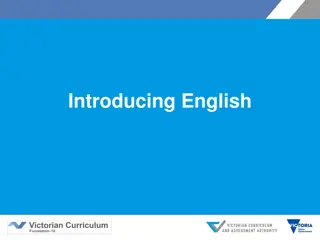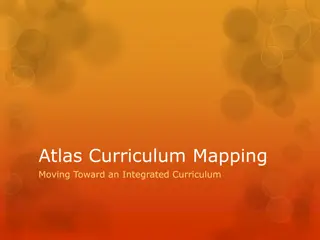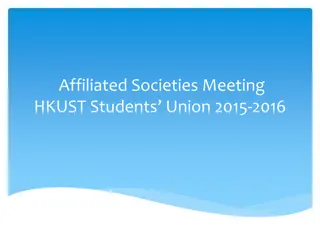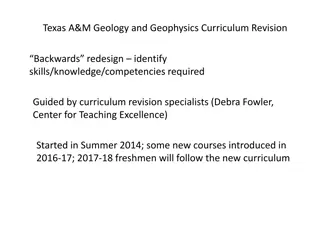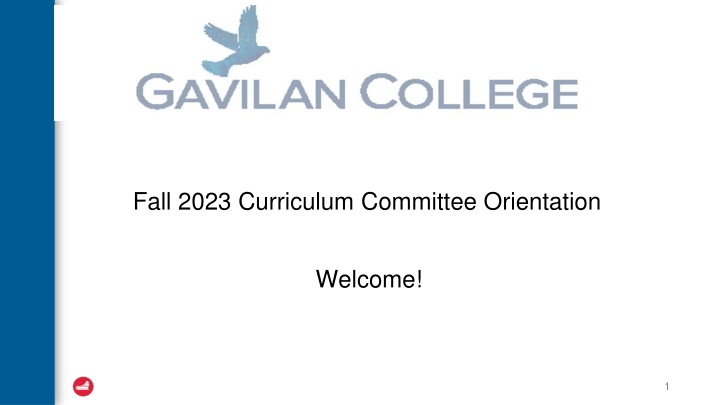
Fall 2023 Curriculum Committee Orientation Overview
Explore the roles and responsibilities of the Fall 2023 Curriculum Committee in this orientation session. Learn about California laws, Title 5 regulations, and the significance of Academic Senate in curriculum development. Discover the importance of 10+1 consult collegially and the standards for courses, certificates, and curriculum committees. Join us to understand the critical aspects of academic and professional matters, including faculty roles, accreditation processes, and program reviews.
Download Presentation

Please find below an Image/Link to download the presentation.
The content on the website is provided AS IS for your information and personal use only. It may not be sold, licensed, or shared on other websites without obtaining consent from the author. If you encounter any issues during the download, it is possible that the publisher has removed the file from their server.
You are allowed to download the files provided on this website for personal or commercial use, subject to the condition that they are used lawfully. All files are the property of their respective owners.
The content on the website is provided AS IS for your information and personal use only. It may not be sold, licensed, or shared on other websites without obtaining consent from the author.
E N D
Presentation Transcript
Today we will discuss Fall 2023 Curriculum Committee Orientation Welcome! 1
Todays Agenda Introductions Overview of Curriculum Committee Resources Needed Updates Demonstrations 2
Roles & Responsibilities California Laws & Codes - Education Code Standing committee of Academic Senate https://asccc.org/ http://www.gavilan.edu/committee/senate/index.php To ensure the right of academic senates to assume primary responsibility for making recommendations in the areas of curriculum and academic standards.
Title 5 Regulations Interprets Education Code into Regulations California Code of Regulations Title 5 - Education Division 6 - California Community Colleges Chapter 2 - Academic Senates Academic and professional matters - 10+1 Consult collegially - relying primarily upon the advice and judgement of the academic senate. 4
What is 10 + 1? According to TITLE 5: 53200, Academic Senate is an organization whose primary function is to make recommendations with respect to academic and professional matters. Academic and Professional matters include the following policy development matters: 1. Curriculum, including establishing prerequisites. 2. Degree and certificate requirements. 3. Grading policies. 4. Educational program development. 5. Standards or policies regarding student preparation and success. 6. College governance structures, as related to faculty roles.
10 + 1 (Continued) 7.) Faculty roles and involvement in accreditation processes. 8.) Policies for faculty professional development activities. 9.) Processes for program review. 10.) Processes for institutional planning and budget development. 11.) Other academic and professional matters as mutually agreed upon. As a standing committee of Gavilan s Academic Senate, we play a primary role in 10 + 1
Title 5 Regulations Interprets Education Code into Regulations Chapter 6 - Curriculum and Instruction Article 1 ( 55002) Standards and Criteria for Courses Defines Curriculum Committees, standards for approval, COR, standards for credit, noncredit, and community education Article 4 ( 55040 - 55046) Course Repetition Article 6 ( 55063) Minimum Requirements for the Associate Degree Article 7 ( 55070) Credit Certificates
Program and Course Approval Handbook (PCAH) https://www.cccco.edu/-/media/CCCCO-Website/docs/handbook/program-course- approval-handbook-8th- edition.pdf?la=en&hash=ACB8BD54D5D41C84946997A66D5451FA0B5F4109 Prepared by the California Community Colleges Chancellor s Office Educational Services and Support and the California Community Colleges Curriculum Committee (5C) Criteria and standards for Credit courses and programs Data elements, course outline of record Credit hour calculations Repetition, distance education, work experience Associate degree/certificate standards, criteria for approval Noncredit courses and programs Competency vs. Completion, criteria for approval
Course Outline of Record The course outline of record is a document with defined legal standing that plays a critical role in the curriculum of the California community colleges. Detailed requirements: https://www.asccc.org/sites/default/files/COR.pdf Gavilan s Repository: http://www.gavilan.edu/committee/curriculum/course_outline_1.php
Role of Administrators Brings a balance to the student-centered faculty perspective with regulatory and statutory compliance requirements within the college s budgetary constraints. Evaluates the Course Outline of Record as a public and legally binding document produced by the college. Helps communicate how curricular changes will impact other areas of the college (share 100 ft view.) Supports the leadership of the Curriculum Chair
Calendar Meeting Dates, 5-year list, Deadlines Meeting schedules are posted on our Gavilan Curriculum Committee Webpage Update lists are linked from the same page http://www.gavilan.edu/committee/curriculum/Fall_Meeting_Due_ Dates.php 11
Brown Act Public Access to Meetings Government Code 54954.2 Regular Meeting Agendas must be posted 72 hours prior Must state meeting location and time Must be freely accessible to the public Cannot be posted solely on internet website
Curriculum Committee Brown Act Standing Committees of a legislative body (Academic Senate) are subject to the Brown Act. Standing committees, irrespective of composition, which have either: (1) a continuing subject matter jurisdiction, or (2) a meeting schedule fixed by resolution or formal action of the legislative body. Bottom Line: For compliance, we need to continue with in-person meetings
Articulation Processes & Guidelines Rosa Sharboneau, Articulation Officer
Ongoing Curriculum Conversations AB 705 , 1705 Guided Pathways Common Course Numbering (AB 1111) Credit for Prior Learning Technology (CurriQunet) Common lower division GE transfer pattern for CCC, CSU, UC
Needed Updates: Bylaws (Spring 2021) Updated Bylaws (May 10, 2021) We will need to form a work session (1 hour?) to update the current bylaws for approval by the Curriculum Committee.
Other Needed Updates Course Outline Checklist Curriculum Handbook
Demonstrations (James) Evaluating & Approving Modifications and New Proposals Curriqunet







